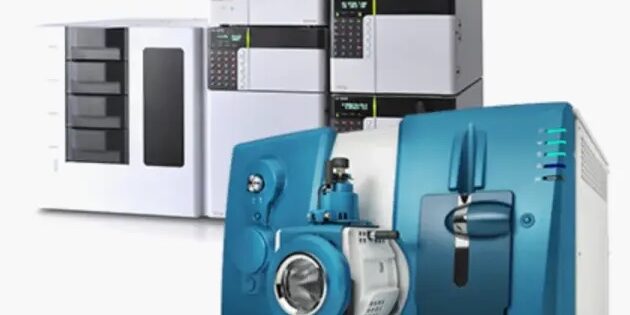
LCMS Instrument with an ABSciex mass spectrometer and Shimadzu LC stack used in a clinical laboratory setting.
Clinical laboratories utilize Liquid Chromatography-Mass Spectrometry (LCMS) instruments for a variety of important applications due to their high sensitivity, specificity, and ability to analyze complex biological samples. Key uses in clinical labs include:
- Drug Monitoring and Pharmacokinetics: LCMS is widely used for therapeutic drug monitoring, where the concentration of drugs in a patient’s bloodstream is measured to ensure optimal dosing. It is also used in pharmacokinetic studies to understand how drugs are absorbed, distributed, metabolized, and excreted in the body.
- Toxicology and Drug Screening: LCMS is essential in toxicology for detecting and quantifying toxins or drugs in biological samples. It’s particularly useful in emergency situations for identifying unknown substances in a patient’s system, such as in cases of overdose or poisoning.
- Clinical Diagnostics: LCMS helps in diagnosing diseases by detecting and quantifying biomarkers in biological samples. For instance, it can measure hormone levels for endocrine disorders or identify specific proteins associated with certain cancers.
- Metabolomics and Biomarker Discovery: In research settings, LCMS is used for metabolomics—the study of metabolic processes by analyzing the complete set of metabolites in a biological sample. This helps in discovering new biomarkers for diseases, which can then be used in clinical diagnostics.
- Personalized Medicine: LCMS aids in personalized medicine by analyzing genetic variations that affect drug metabolism. This ensures that patients receive medications tailored to their specific genetic makeup, maximizing efficacy and minimizing side effects.
- Neonatal Screening: In newborn screening, LCMS is used to detect metabolic disorders early on. By analyzing small blood samples from newborns, it can identify disorders like phenylketonuria or hypothyroidism, which are crucial for early intervention.
- Infectious Disease Testing: While less common, LCMS can be used for detecting and identifying pathogens, such as bacteria or viruses, by analyzing their unique protein or metabolic profiles.
LCMS in clinical labs offers unparalleled specificity and sensitivity, making it an invaluable tool for precise diagnosis, effective treatment planning, and comprehensive research in the medical field. A proven example of the high performance of an LCMS instrument in a clinical laboratory setting can be found at Meridian Diagnostics. Meridian utilizes these complex mass spectrometers to provide accurate toxicology testing on specimens by quantifying results of detected analytes in nanograms per microliter of urine. Its ability to handle other complex biological matrices like blood, plasma, and tissue samples makes it particularly suitable for clinical applications.







